|
Limitar tu búsqueda
[+–] Compilador o editor
[+–] Editorial
[+–] Fecha
[+–] Formato
[+–] Idioma
[+–] Tipo de documento
[+–] Tipo de recurso
|

|
|
Valores y principios
Este documento forma parte de la serie de manuales de la seguridad social que se han desarrollado en el marco del Programa Seguridad Social para Todos, los cuales tienen el propósito principal de promover los valores y principios de la seguridad social.
|
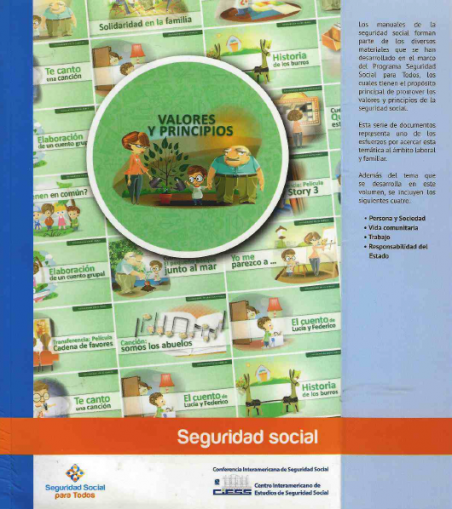
|
|
|
|

|
|
Vida comunitaria: derechos y obligaciones de las personas
Este documento forma parte de la serie de manuales de la seguridad social que se han desarrollado en el marco del Programa Seguridad Social para Todos, los cuales tienen el propósito principal de promover los valores y principios de la seguridad social.
|
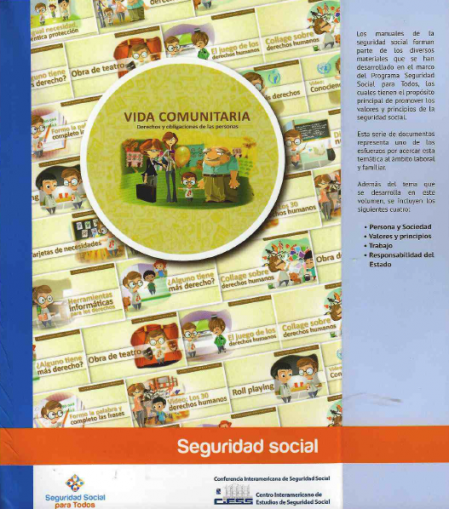
|
|
|
|

|
|
Responsabilidad del Estado
Este documento forma parte de la serie de manuales de la seguridad social que se han desarrollado en el marco del Programa Seguridad Social para Todos, los cuales tienen el propósito principal de promover los valores y principios de la seguridad social.
|
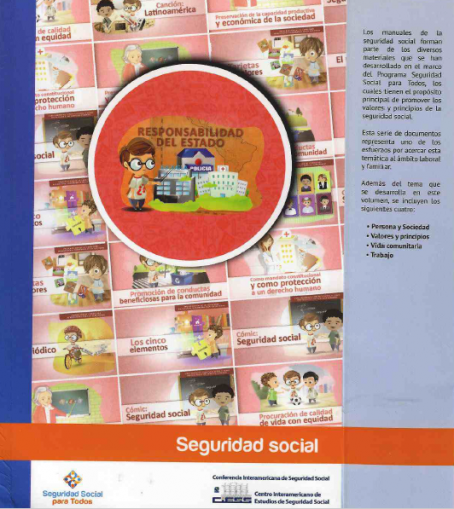
|
|
|
|

|
|
The effect of migration on the labor market outcomes of the sender household: a longitudinal approach using data from Nicaragua
In this paper, I use longitudinal data from the 1998 and 2001 Living Standard Measurement Surveys in Nicaragua to examine the impact of the emigration of household members on the household labor market integration and poverty. The main findings of the paper are that households from which an emigrant left had a reduction in members, a reduction in working members, a reduction in labor income than...
|
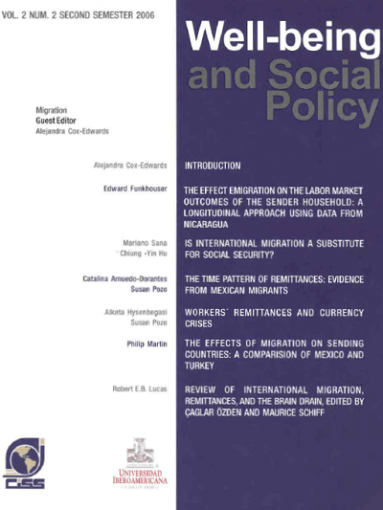
|
|
|
|

|
|
Family health expanditure and demand: an analysis based on the consumer expenditure survey - POF - 2002/2003
This paper aims at analyzing healthcare expenditure and demand of families, by estimating income-elasticity and price-elasticity for ten groups of products using the so-called model Linear Almost Ideal Demand System (LAIDS). The 2002/03 consumer expenditure surveys (POF) of the Fundação Instituto Brasileiro de Geografia e Estatística – FIBGE (Brazilian census bureau) are used, providing extremely...
|
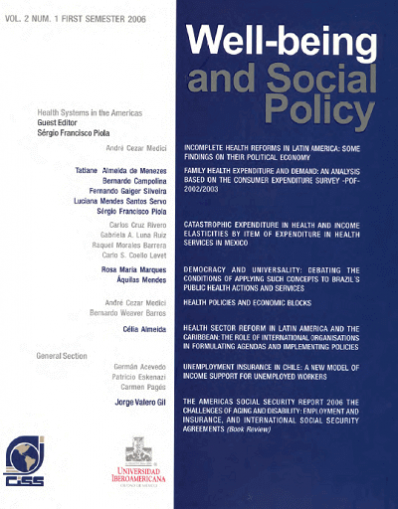
|
|
|
|

|
|
Incomplete health reforms in Latin America: some findings on their political economy
This paper raises the point that only few health reforms implemented in Latin American countries modified the existing health systems in order to fix the problems brought by the institutional fragmentation typical of this sector. A great part of these reforms did not implemented the necessary measures to improve coordination among health systems in the prevailing pluralistic model and besides,...
|
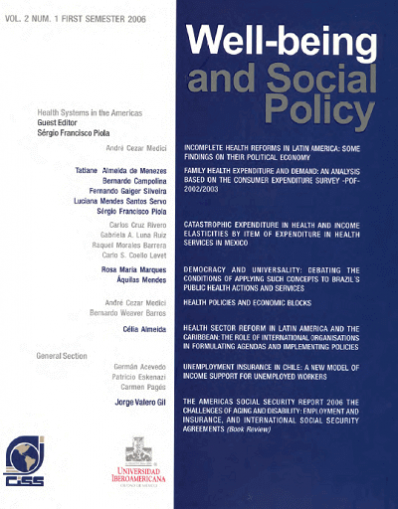
|
|
|
|

|
|
The Americas Social Security Report 2005: labor markets and the fragmentation of social insurance, financing for HIV-AIDS by social security (Book review)
The Americas Social Security Report 2005, published by the CISS, gathers the contributions, opinions, and comments of more than 30 social security specialists from different countries in the American continent, as well as the review of the most recent literature on this matter. The purpose is to present, to specialized public and to laymen, a detailed, analytic, and updated report of the...
|
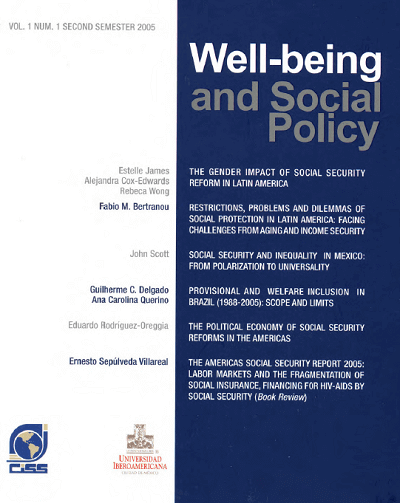
|
|
|
|

|
|
Introducción (sobre los sistemas de protección social que se aborda en el presente número de la revista)
La construcción del estado de bienestar en México inició en torno a los años de la Gran Depresión y la Segunda Guerra Mundial, como una gran movilización nacional que a su vez formó parte de un compacto global para mejorar las normas laborales y establecer sistemas nacionales de seguridad social. La Conferencia Interamericana de Seguridad Social se fundó en 1942 en apoyo a ese movimiento. En este...
|
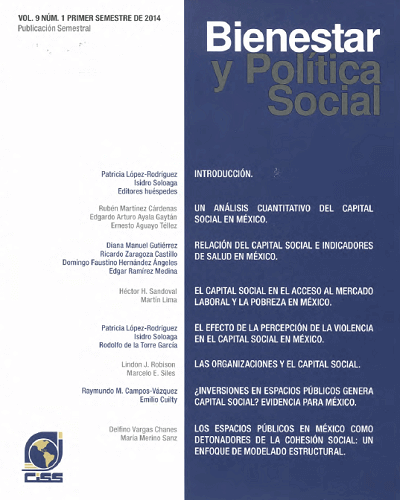
|
|
|
|

|
|
Seguridad social universal centrada en el ciudadano
Este ensayo revisa la situación de la protección social en México, así como diversas propuestas y opciones para su reforma. Una guía es el concepto de piso de protección social que han definido la Organización Internacional del Trabajo y la Organización Mundial de la Salud. Se tratan temas de forma más general bajo los grandes apartados de programas de familia, pensiones, salud y empleo, así como...
|
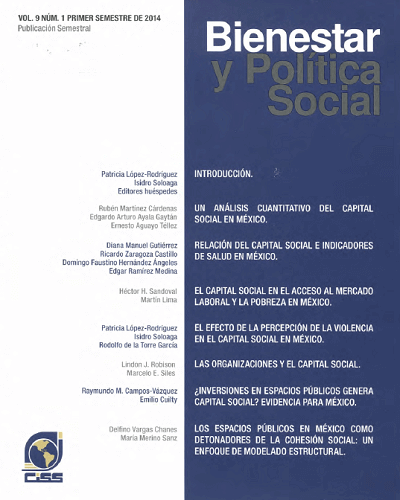
|
|
|
|

|
|
Informe sobre la seguridad social en América 2011: Niños y seguridad social
El principal objetivo de la seguridad social es el de mantener el bienestar de los individuos a lo largo de toda su vida y funcionar como una institución de solidaridad. Durante las últimas décadas se ha discutido y avanzado sobre temas de envejecimiento, pero poco se conoce sobre las condiciones de los niños en América y la forma en que la seguridad social los apoya, después de todo, los niños...
|
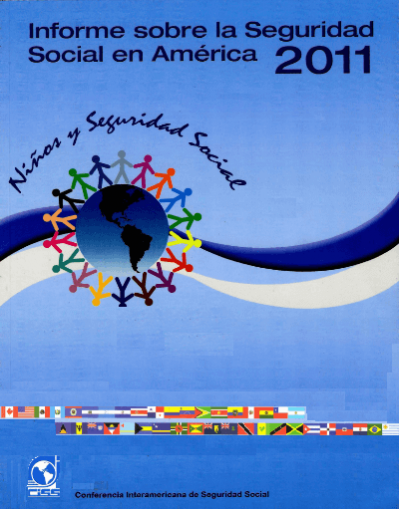
|
|
|
|

|
|
The health insurance reform in the Netherlands and its relevance for Mexico
Alrededor del mundo se observan dos versiones de la organización de los seguros de salud; la seguridad social basada en el empleo, y los servicios nacionales de salud. En Latinoamérica regularmente se usa la primera, pero se está lejos de lograr la cobertura universal. En los Países Bajos encontramos una peculiar mezcla de obligaciones públicas y responsabilidades privadas. La cobertura universal...
|
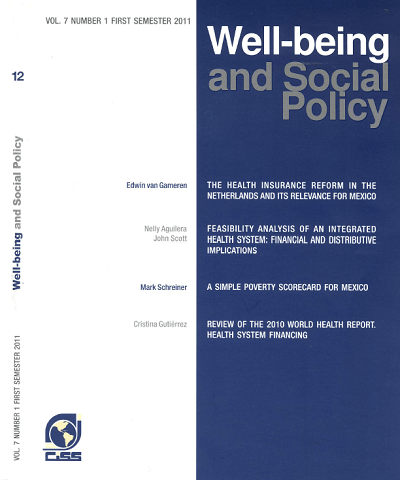
|
|
|
|

|
|
Informe sobre la seguridad social en América 2009: Evaluación de los sistemas de seguridad social
Este Informe de 2009 sobre la Evaluación en los Sistemas de Seguridad Social tiene un vínculo natural con el tema del año pasado. En esa ocasión tratamos el tema Innovando los Modelos de Aseguramiento Social, un campo en el que la administración y la organización son palabras clave. Ahora, nos ocupamos de la evaluación, lo cual es una forma de medir y administrar actividades, resultados y...
|
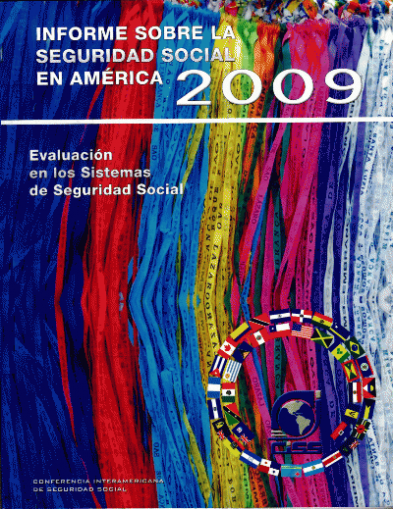
|
|
|
|

|
|
MSMES in Costa Rica: Chronicle of their poor integration in times of accelerated international integration
El presente documento, está centrado en las Mipyme y en las políticas públicas para su fomento en la economía costarricense. El análisis, se hace a partir de un enfoque alternativo de clasificación de las actividades económicas, el cual permite precisar con mayor detalle las desigualdades entre las actividades tradicionales de amplia trayectoria en la economía, de aquellas actividades que han...
|
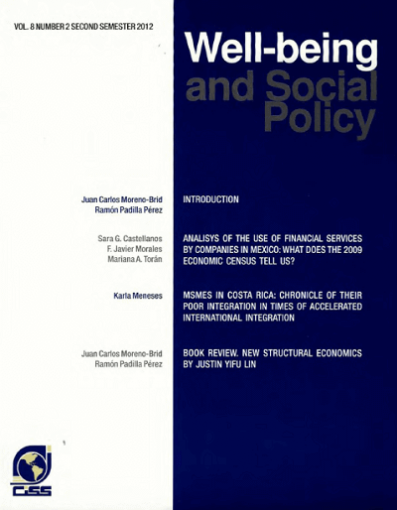
|
|
|
|

|
|
Public spaces in Mexico as social cohesion promoters: an structural modeling perspective
This research assessed the effects of several contextual factors (e.g, neighborhood insecurity, evaluation of public spaces, infrastructure, low risk behaviors) on social cohesion and residential satisfaction, in the context of low and medium-low socio economic status of individuals nearby renovated public spaces (parks and recreational facilities) in Mexico. The research method is based on...
|
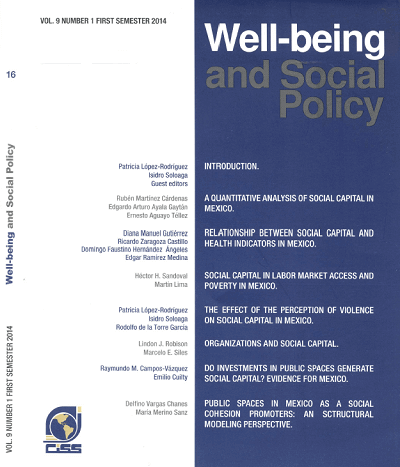
|
|
|
|

|
|
Do investments in public spaces generate social capital? Evidence for Mexico
The formation of social capital is critical for developing countries. This paper investigates the effects of attempts to recover public spaces in marginalized areas of Mexico. The effects are estimated through balancing in the propensity scores. We focus on the results of perception of safety, support and social capital. When efforts are made to recover public spaces, the perception of safety...
|
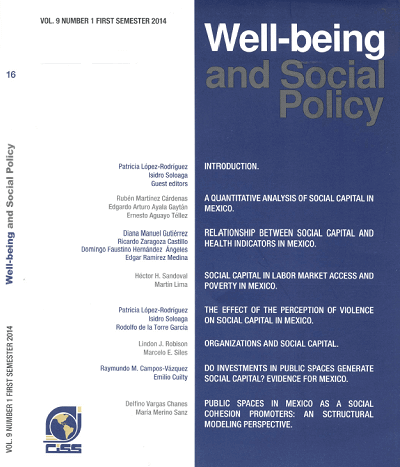
|
|
|
|

|
|
Organizations and social capital
An organization is a group of persons who satisfy established membership requirement and whose form and function are generally acknowledged. An organization's membership requirements may be based on inherited or earned traits. Organizations exist because they provide a setting in which members with similar traits can meet their physical and their socioemotional needs. As the relative importance...
|
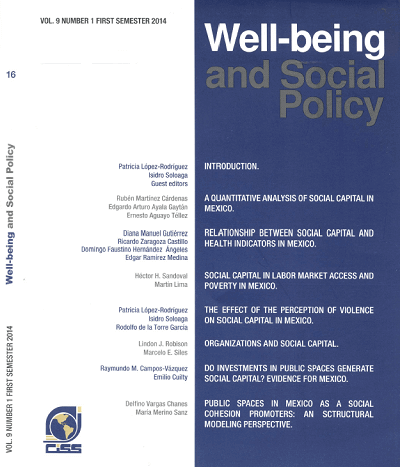
|
|
|
|

|
|
Informe de seguridad social y bienestar en las Américas 2020. Versión abreviada
Esta información permitirá formular recomendaciones de política pública que promuevan una seguridad social universal, de calidad y orientada al bienestar en las Américas, como parte de los esfuerzos basados en la cooperación internacional para garantizar el acceso a este derecho humano. Antes de comenzar, debe decirse que el ISSBA no se publica en un momento cualquiera, sino en medio de una de...
|
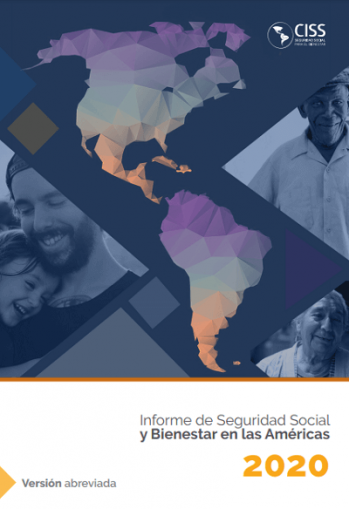
|
|
|
|

|
|
The effect of the perception of violence on social capital in Mexico
Increasing levels of violence in Mexico, which have the potential to damage the very fabric of 1 society, as well as impact key economic variables, led us to analyze the effect that changes in the perception of violence had on social capital fluctuations (including associative capital) between 2006 and 2011. This was a period in which an anti-violence and anti-organized crime policy was launched...
|
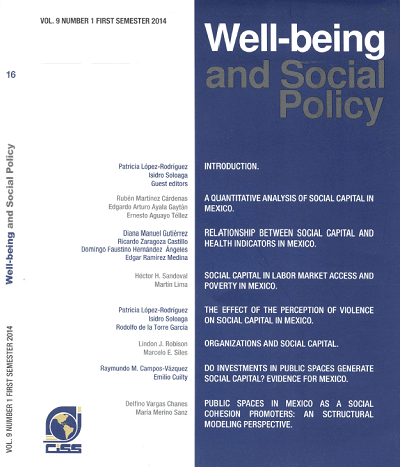
|
|
|
|

|
|
Social capital in labor market access and poverty in Mexico
Social capital, defined as the set of social networks that a person has in order to obtain benefits, is used by the population as a mechanism for providing resources, to cushion shocks in consumption and to obtain information on available employment opportunities. This study employs a logistic model to characterize the manner in which people access the labor market in Mexico through the use of...
|
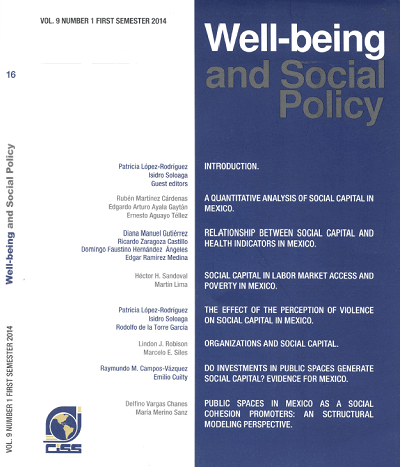
|
|
|
|

|
|
Relationship between social capital and health indicators in Mexico
This study analyzes the relationship between social capital types and access to health services in Mexico. To this end, access to healthcare data from the 2006 ENCASU and 2011 ENCAS was validated using 2006 and 2012 ENSANU results. Indicators were found to be consistent. A statistical analysis of the distribution of social capital and health indicators by region, as well as by rural or urban area...
|
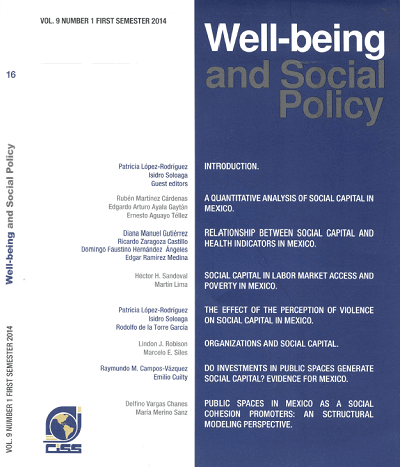
|
|
|
|
|